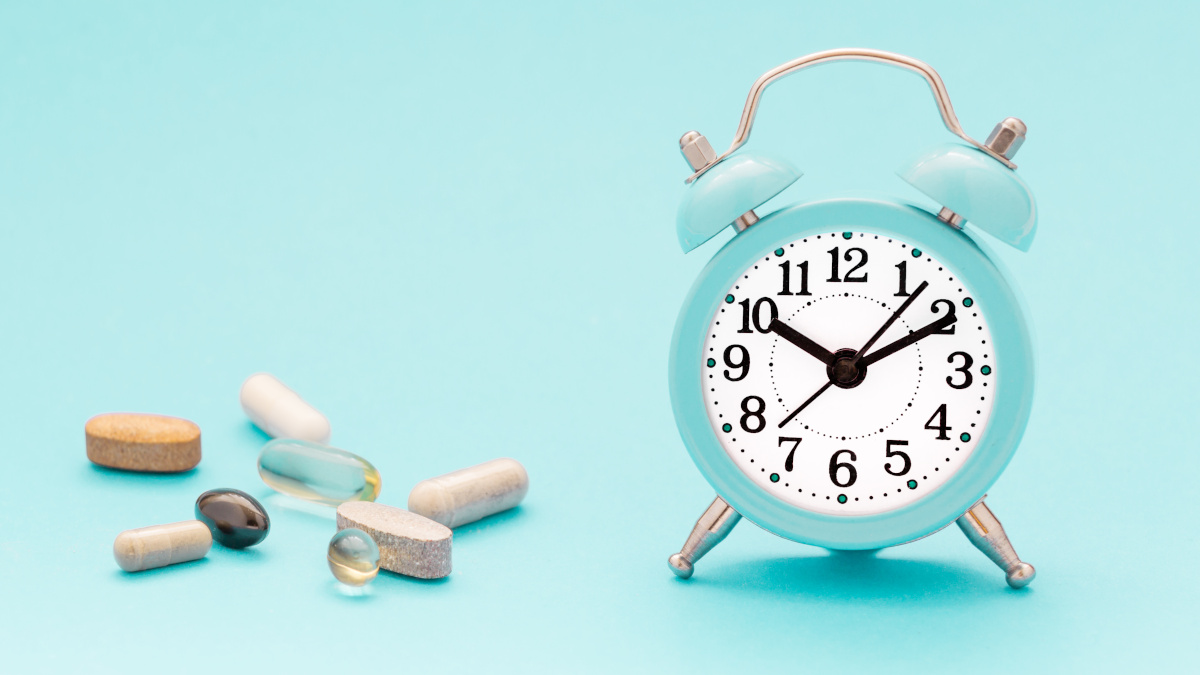Dietary supplements: what’s the best time of day to take them?
What’s the best time of day to take your dietary supplements in order to gain maximum benefit from them? Which ones should be taken with food and which in between meals? Here we address all your practical issues.

Follow the dosage advice
The most important thing is to heed the dosage advice for the supplement, as well as the recommended use and (maximum) daily dose, which appear on the label. And if you have been advised to take a particular dose by a health professional make sure you follow it.
Be sure too, to take a few days’ break in between different courses of the same supplement.
If you’re in any doubt about a supplement’s contraindications or potential interactions with a particular medication, consult a health professional. In the case of pregnant women, nursing mothers, adolescents and children,, medical advice should always be sought before taking any supplements.
If the label doesn’t specify otherwise, you can take the supplement at any time, ensuring you follow the dose indicated. If the label simply says take 6 capsules or tablets a day, we’d advise spreading them out across the day (2 in the morning, 2 at lunchtime and 2 in the evening, for example). Let’s now look at the most commonly-indicated timings for some of the large supplement groups ...
Vitamins A, D, E and K are absorbed best when taken with food
Vitamins A, D, E and K are fat-soluble, which means they are easily stored in the body’s fatty tissues for use when needed (1-2).
It’s therefore best to take your vitamin A, vitamin D, vitamin E and vitamin K supplements, or your multivitamins (such as Daily 3) , with a meal. To obtain the benefits of these supplements from the start of the day, you can take them with your breakfast which should ideally contain an adequate amount of fat (butter, cheese, eggs, avocado ...). Depending on the recommended dosage for your supplement, you can take another dose with your lunch or dinner.
When it comes to winter meals, focus in particular on taking your vitamin D. The lack of sunlight at this time of year means that deficiencies in the ‘sunshine vitamin’ are common, and it’s important to compensate for this with the right diet, and supplementation if you wish (3). You could, for example, opt for a vitamin D supplement with high bioavailability such as Vitamin D3 5000 IU.
Supplements to take in the morning
The B vitamins are water-soluble (4) and can be taken at any time of day. But it’s worth taking them in the morning so that you start benefiting from them as early in the day as possible.
We know, for example, that vitamin B12 supports normal energy metabolism and helps reduce fatigue (5). The perfect start to the day! Vegetarians, vegans and ‘flexivores’ (who eat a mainly vegetarian diet), will, in particular, benefit from B12 supplementation (with Methylcobalamin), as it’s a vitamin primarily found in animal-source products (6).
Spirulina supplements can also help increase your energy levels. So again, it’s best to take spirulina in the morning and again in the afternoon rather than the evening.
What’s the best time to take probiotics?
There’s an ongoing debate! First thing in the morning, before you’ve eaten anything, the stomach is very acidic which means there’s a greater risk that the microorganisms in the probiotic supplements won’t reach the gut intact . But after you’ve eaten, there’s a different problem: the ingested food may mean the micro-organisms remain blocked for too long in the stomach, and may be destroyed by stomach acids.
It’s therefore best to take probiotics with a light meal or snack - or up to 30 minutes before (7). Again, if your supplement label gives more specific advice, be sure to follow it.
Either way, try to choose a high-quality probiotic, designed to maximise the viability of its microorganisms, such as Lactobacillus gasseri or Probio Forte™.
Fish oil: at the beginning of a meal
Taking a fish oil supplement allows you to increase your intake of omega-3, including the essential fatty acids EPA and DHA... As we know, EPA and DHA support healthy heart function and DHA helps maintain normal brain function, etc. (8) Significant amounts are offered by supplements such as Super Omega 3.
It’s best to take your fish oil supplements at the beginning of a meal. This way, the omega-3 fatty acids will stay in the stomach for less time, quickly making their way to the gut, where they can then start to benefit the whole body as quickly as possible.
Activated carbon: get your timing right
Activated carbon is able to absorb a number of substances that surround it... But this means it may significantly reduce any nutrients or drugs that you take at the same time.
So if you want to take an activated carbon product, do so at least one hour after a meal, or the same period after taking other supplements or medication(9).
Spread out your mineral supplements
If you’re taking a number of mineral supplements at the same time, be aware that some may affect the absorption of others (10).
For maximum efficacy, leave a two-hour gap between taking your zinc supplement, your iron supplement and your calcium supplement, as well as between eating a meal.
And at bedtime ...
Finally, we recommend taking any soluble fibre supplements at bedtime. Fibre can actually impair the absorption of other nutrients and medicines (11). So it’s best taken before you go to sleep, leaving a reasonable interval after eating and after taking any vitamins or medication.
Follow this advice for a supplement high in soluble fibre, such as Psyllium Seed Husk.
References
- Albahrani AA, Greaves RF. Fat-Soluble Vitamins: Clinical Indications and Current Challenges for Chromatographic Measurement. Clin Biochem Rev. 2016;37(1):27-47.
- National Research Council (US) Committee on Diet and Health. Diet and Health: Implications for Reducing Chronic Disease Risk. Washington (DC): National Academies Press (US); 1989. 11, Fat-Soluble Vitamins. Available from: https://www.ncbi.nlm.nih.gov/books/NBK218749/
- Gani LU, How CH. PILL Series. Vitamin D deficiency. Singapore Med J. 2015;56(8):433-437. doi:10.11622/smedj.2015119
- Lykstad J, Sharma S. Biochemistry, Water Soluble Vitamins. [Updated 2020 Apr 12]. In: StatPearls [Internet]. Treasure Island (FL): StatPearls Publishing; 2020 Jan-. Available from: https://www.ncbi.nlm.nih.gov/books/NBK538510/
- EU Register of nutrition and health claims made on foods (v.3.5)
- Rizzo G, Laganà AS, Rapisarda AM, et al. Vitamin B12 among Vegetarians: Status, Assessment and Supplementation. Nutrients. 2016;8(12):767. Published 2016 Nov 29. doi:10.3390/nu8120767
- Tompkins TA, Mainville I, Arcand Y. The impact of meals on a probiotic during transit through a model of the human upper gastrointestinal tract. Benef Microbes. 2011 Dec 1;2(4):295-303. doi: 10.3920/BM2011.0022. PMID: 22146689.
- EU Register of nutrition and health claims made on foods (v.3.5)
- Silberman J, Galuska MA, Taylor A. Activated Charcoal. [Updated 2020 Aug 11]. In: StatPearls [Internet]. Treasure Island (FL): StatPearls Publishing; 2020 Jan-. Available from: https://www.ncbi.nlm.nih.gov/books/NBK482294/
- Jayalakshmi S, Platel K. Supplemental levels of iron and calcium interfere with repletion of zinc status in zinc-deficient animals. Food Funct. 2016 May 18;7(5):2288-93. doi: 10.1039/c6fo00134c. Epub 2016 Apr 22. PMID: 27101872.
- González Canga A, Fernández Martínez N, Sahagún Prieto AM, García Vieitez JJ, Díez Liébana MJ, Díez Láiz R, Sierra Vega M. Dietary fiber and its interaction with drugs. Nutr Hosp. 2010 Jul-Aug;25(4):535-9. English, Spanish. PMID: 20694287.
Keywords
2 Days
Super smart is really…super !
I would like to share my excellent experience with the company’s fast and efficient customer service. Even though I was calling from abroad, I was able to reach them relatively quickly. They responded to all my emails promptly and kept me consistently informed about the status of my order. When I needed assistance correcting a mistake I had made with my order, Ms. Lorie handled the issue immediately and very professionally. Thanks to their support and efficiency, I received my Super Smart products in Greece much faster than expected. Thank you very much for the outstanding service!
Kazanti Kleopatra
5 Days
Ordering and delivery is easy and fast
Ordering and delivery is easy and fast
Peter
7 Days
Simple and quick :-)
My order was delivered quickly, and I'm satisfied with the product! It was lot less fuss compared with some things I've ordered.
DEL Jacqueline
7 Days
Excellent quality products & customer…
Excellent quality products & customer service & care …thank you!
Giovanna Escalera
8 Days
great experience
Easy ordering, fast deliver, very professionally.
Natasa
12 Days
this company and its products are…
this company and its products are perfect: I have been their customer for three years , prices are reasonable for the high quality they offer , the products are of very good quality not just plainly "normal" , delivery is quite fast. we are very satisfied with them.
Gabriel Diacakis
12 Days
TOP service TOP products will buy again…
TOP service TOP products will buy again and again
PINOTTI Giorgio
14 Days
Trustworthy company with tested products
Trustworthy company with tested products
Trusted
18 Days
Efficiency and speed
Efficiency and speed
Cuccie
20 Days
GOOD BRAND IN FOOD COMPLEMENTS
GOOD BRAND IN FOOD COMPLEMENTS - SERIOUS WITH GOOD DOCUMENTS AND DETAILS SCIENTIST. AND SERIOUS HONNEST COMMERZIALISATION. I HAVE TRUST IN THEIR PRODUCTS.
FENOGLIO Guy
22 Days
Very good experience
Very good experience, the products arrived in time, in perfect condition and are good quality. Thank you.
GABI TIRCOCI
27 Days
very good expereince
very good expereince
Jelena Đaković
27 Days
Very good products.
Very good products.
Agnes BENDSAK
30 Days
Just OK
Just OK, ordering from company for many years and being safisfied
Lynn Mae
30 Days
Recomendo
Produtos encomendados são recebidos atempadamente e de acordo com o anunciado! Muito satisfeita!
Carla Sofia
of experience
your money back
##montant## purchase




